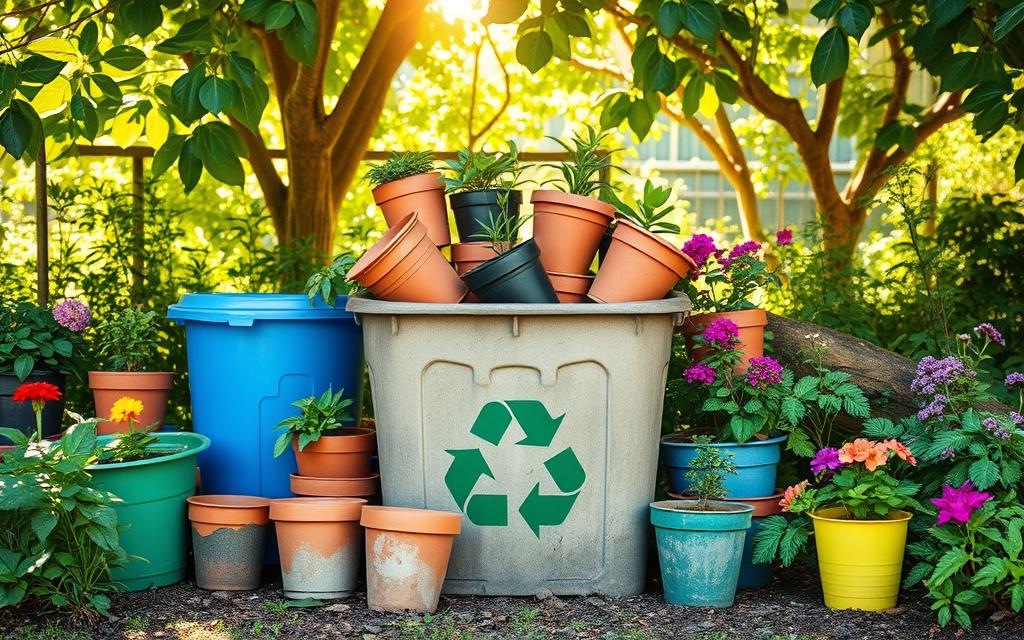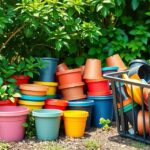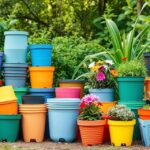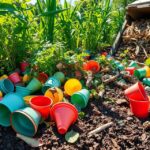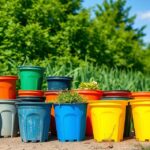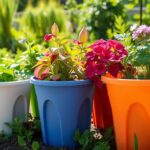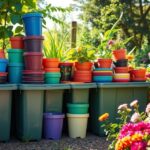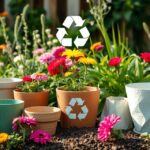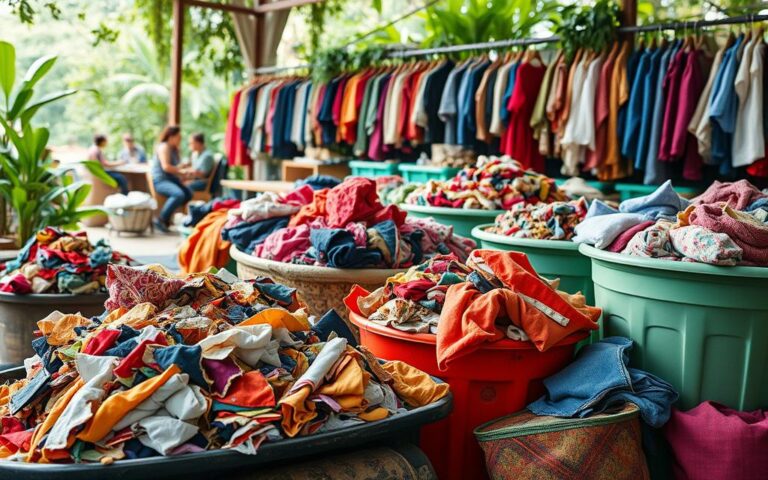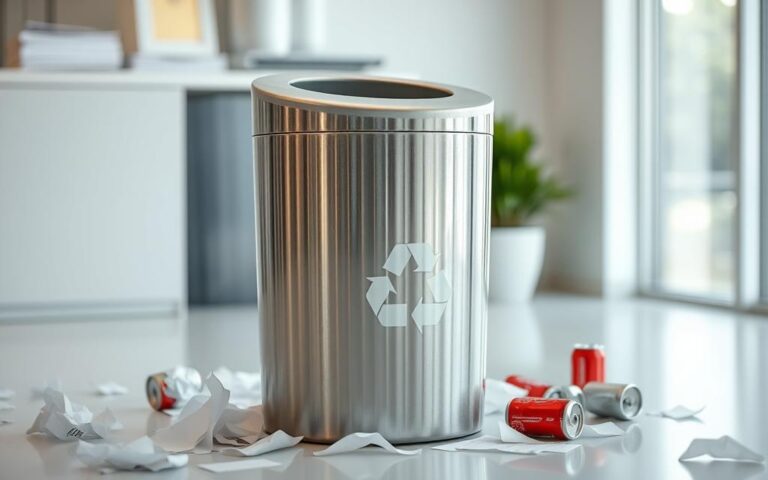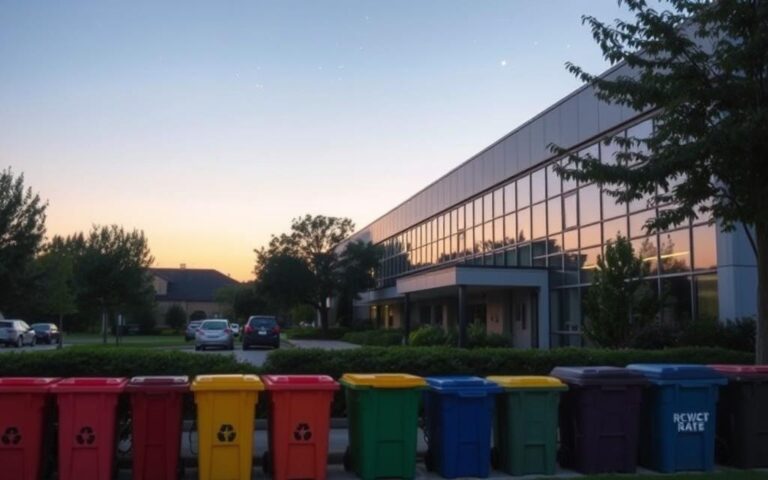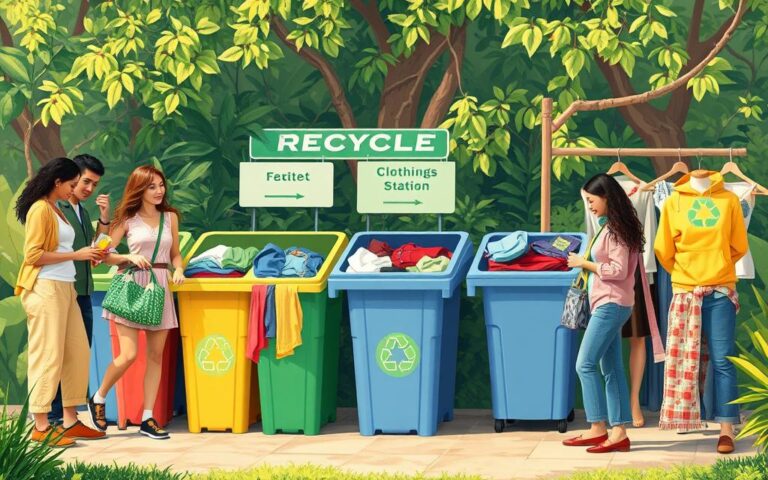Can You Recycle Plant Pots? Proper Disposal Tips
Understanding how to recycle plant pots is key for eco-conscious gardeners. Many of them wonder what to do with empty plastic pots. These pots are often hard to recycle through curbside programs because of the materials they’re made of.
But there are ways to make sure these pots don’t add to garden waste. You can return them to stores like Home Depot or Lowe’s. These stores have started recycling lots of plastic nursery pots. Local nurseries might also take them back for reuse.
If you’re aiming for sustainability, consider upcycling or finding new uses for these pots. Discovering creative ways to recycle can help the environment. It keeps plastics out of landfill and supports a greener garden.
Understanding the Recycling of Plant Pots
Recycling plays a key part in reducing the environmental harm caused by plastic waste. Gardeners often add to this problem when they throw away plant pots. Learning about recycling can help us all do better in our gardening habits.
The Importance of Recycling in Gardening
Recycling cuts down on landfill waste and promotes a sustainable cycle of use. By recycling plant pots, gardeners turn potential waste into useful items. This effort supports soil health and biodiversity. With millions of tons of plastics thrown away every year, every bit of recycling helps our gardens thrive sustainably.
Common Materials Used in Plant Pots
Plant pots are made from various plastics, including high-density polyethylene (#2), polypropylene (#5), and polystyrene (#6). Knowing these materials helps in proper recycling. This is because different places have different rules about recycling them. For example, since 2013, New York City has recycled rigid plastics such as polypropylene and polystyrene. Yet, it’s important to check with your local recycling services because not everywhere accepts these materials.
| Plant Pot Material | Recycling Code | Notes |
|---|---|---|
| High-Density Polyethylene | #2 | Widely recycled in many areas |
| Polypropylene | #5 | Accepted by some recycling centres, check local guidelines |
| Polystyrene | #6 | Varies by location; not universally accepted |
Being aware of the materials in plant pots boosts our recycling efforts. It encourages better practices in the gardening community. This leads to a positive impact on the environment.
Can You Recycle Plant Pots?
Recycling plant pots is about knowing which materials work and the myths involved. Gardeners often wonder which pots help recycling efforts. Understanding this can make a big difference in being eco-friendly.
Identifying Recyclable Materials
It’s important to know which plant pots can be recycled. Not all pots are suitable, especially black plastic ones, because recycling centers can’t spot them easily. It’s vital to clean pots of all soil before recycling. Dirt can ruin the recycling process.
About 25% of centers want pots that are clean and dry. And, 10% say pots must also be in good shape to be reused. Most pots that can be recycled are made from certain plastics. These can turn into things like car battery cases and bins.
Common Myths About Plant Pot Recycling
There are quite a few wrong ideas about recycling pots. Not all plastics can be recycled at the curb because some places can’t sort black plastic. Also, some people think they don’t need to clean pots, which isn’t true. Remaining soil or dirt can cause problems in recycling.
Research shows 40% of places let you drop off pots for free. And, 15% will pick them up for a charge. Knowing this can help clear up any wrong beliefs and promote correct recycling of plant pots.
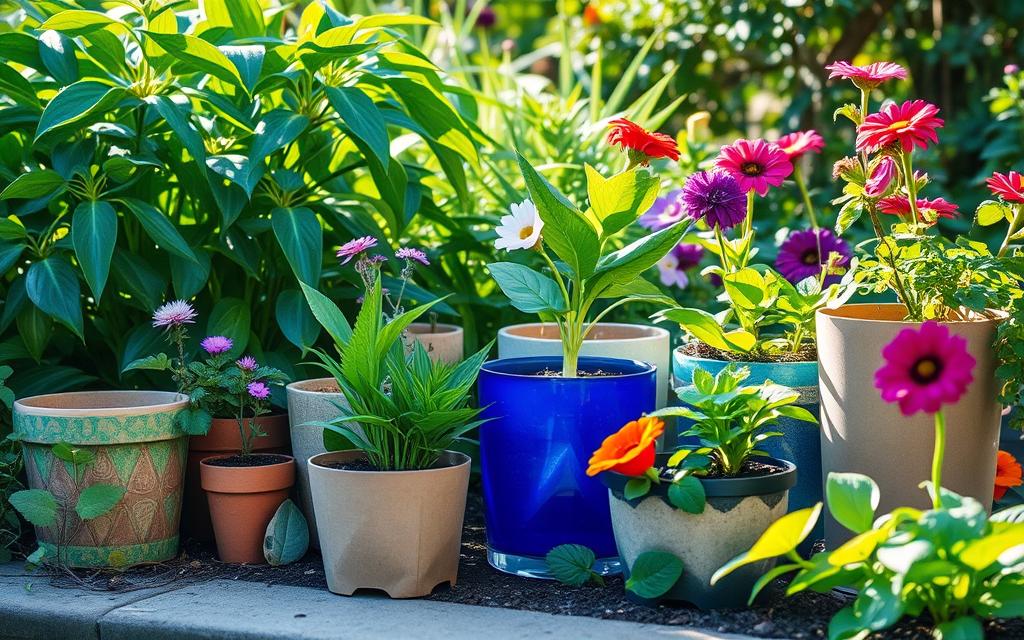
| Vendor Services | Percentage |
|---|---|
| Free drop-off services | 40% |
| Require pots to be clean and dry | 25% |
| Provide pick-up services for a fee | 15% |
| Accept pots in good condition for reuse | 10% |
| Accept commercial quantities | 5% |
Proper Disposal Methods for Plastic Plant Pots
Knowing the best ways to throw away plastic plant pots helps the environment. Before you discard these pots, check your area’s recycling rules. Many areas have their own rules for recycling different plastics.
Checking Local Recycling Guidelines
Recycling rules differ a lot, depending on where you are. In Vancouver, you can recycle black plastic pots, but in Toronto, you cannot. This shows how recycling varies in places across Canada. Often, black plastic pots are not recycled because of the materials they are made from.
Plant pots are usually made from plastic #5 or plastic #2. The soft, bendy pots are often plastic #5. The harder pots are usually plastic #2. Knowing this helps people dispose of pots correctly.
Options for Returning Pots to Garden Centres
Places like Home Depot and Lowe’s have recycling programs for garden pots. You can take back plastic pots to these stores for eco-friendly disposal. It’s smart to check with garden centres about their recycling policies.
If local programs won’t take your pots, consider other options. You could give them to friends or local community gardens. Pots can also be repurposed for storing things, protecting plants from weeds, or for crafts.
Alternative Uses for Old Plant Pots
Old plant pots don’t just have to end up in a landfill. With some creativity, they can turn into useful and attractive things for your garden and home. Upcycling plant pots shows resourcefulness and helps the environment. Through creative gardening, you can find many ways to give old containers new life.
Creative Upcycling Ideas
Upcycling old plant pots is a great way to try creative gardening. Many items around your house can become stylish planters. About 60% of these ideas use repurposed items like teacups and wine glasses. Some creative upcycling ideas include:
- Using old candle jars for small succulents.
- Turning vintage chamber pots into unique flower displays.
- Making custom planters from fabric.
- Choosing rusty toolboxes for herb gardens.
- Creating hanging planters from old kitchen rack caddies.
These ideas help gardeners cut down on waste and make their spaces look better.
How to Repurpose for Seed Starting and Storage
Strong plant pots can be repurposed for starting seeds or storing them. Clean used pots well to keep young plants safe and organize your garden better. Here are some tips:
- Use old cardboard boxes as seedling trays.
- Turn wine glasses into mini greenhouses.
- Grow bigger plants or herbs in washtubs.
- Convert stock tanks into raised garden beds.
- Make decorative seed holders from coffee cans.
These tips make the most of old pots and support a sustainable lifestyle by reducing waste.
| Repurposed Item | New Use |
|---|---|
| Copper Teacups | Decorative Plant Holders |
| Old T-Shirts | DIY Fabric Planters |
| Shopping Carts | Planters for Large Blooms |
| Aluminium Frames | Vertical Garden Displays |
| Glass Jars | Miniature Seedling Containers |
Looking for new ways to use old plant pots can make gardening more eco-friendly and spark your creativity. By putting effort into upcycling plant pots, you can create something special and help the planet.
Innovative Practices in Sustainable Gardening
Sustainable gardening uses methods that help our environment and save resources. It includes using compostable plant containers instead of plastic pots. These containers are great because they break down and feed the soil.
Using Compostable Plant Containers
Compostable containers are made from things like coconut fibres or jute. They’re good for the planet because they break down in the garden. This cuts down on pollution from plastic pots, which can last 500 years. Using these pots shows a strong commitment to looking after our world.
Supporting Local Initiatives for Recycling
Getting involved in local recycling helps sustainable gardening a lot. Community programmes that focus on recycling reduce plastic waste. This helps our local environment. Big companies like Home Depot and Lowe’s recycle many plastic pots, setting a good example. Local gardening groups often run workshops. They teach how to garden responsibly and manage waste well.
| Company | Recycling Efforts | Plastic Waste Recycled |
|---|---|---|
| Home Depot | Plant It Again program | 15 million pounds annually |
| Lowe’s | Plastic pot and other items recycling | Various items including pots and batteries |
| Loblaw | Used pots and flats collection service | 3.60 million kilograms |
By following these new methods and supporting local recycling, we make the environment better. We also encourage others to garden in earth-friendly ways.
Conclusion
To wrap up, recycling plastic pots is key to protect the environment. Many pots take centuries to break down in dumps. So, it’s vital to recycle and reuse where possible. This helps make gardening more sustainable.
Returning pots to garden centres or using local recycling schemes helps cut down waste. You can also give old pots to community gardens or use them in DIY projects. Choosing products from biodegradable materials, like those from Woodland Pulse, also helps. It reduces the use of single-use plastics, aiding the planet’s health.
Green gardening is something we can all do together. By sharing tips with other garden lovers, we help spread the word on eco-friendly gardening. Every small step matters for our planet. Let’s keep up our effort to recycle smartly, for Earth’s sake.
For tips on recycling plastic pots, see the detailed guide here.
FAQ
Can I recycle any type of plant pot?
Not all plant pots can be recycled. Black plastic pots are often rejected because they are hard to detect. Check your local recycling rules to see what you can recycle.
What materials are commonly used in plant pots?
Plant pots are mostly made from different plastics. These include polypropylene (#5), polyethylene (#2), and polystyrene (#6). The ability to recycle these materials depends on your local recycling schemes.
Do I need to clean my plant pots before recycling?
Yes, cleaning plant pots is crucial. They should be free from soil or any leftover materials. Dirty pots can disrupt the recycling process and might be turned away.
Are there any myths about recycling plant pots I should be aware of?
One myth is that you can recycle all plastics at the curb. But, many areas won’t take certain plastics like black pots. Another myth is that you don’t need to clean pots. However, cleaning is vital for recycling.
What should I do if my local recycling centre doesn’t accept plant pots?
If plant pots are not accepted locally, try returning them to garden centres. Places like Home Depot or Lowe’s sometimes accept them back. Or, get creative and find new uses for them through upcycling.
How can I upcycle old plant pots?
You can turn old plant pots into decorative items, bird feeders, or garden markers. Upcycling helps reduce waste and adds a personal touch to your garden.
What are compostable plant containers?
Compostable containers break down in the soil. They’re made from materials that are biodegradable. This option cuts plastic waste and enriches the soil, making your garden more sustainable.
How can I support local recycling initiatives?
Participation in community recycling programmes can boost local green efforts. Join gardening groups to learn about workshops and ways to manage waste responsibly.

